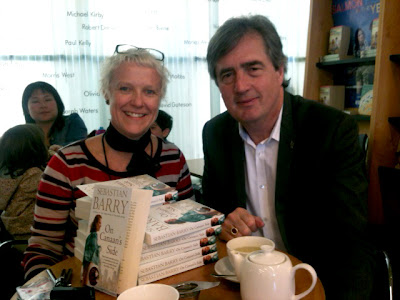 I’m going to be honest here - I’ve never read a Jeanette
Winterson book. But I certainly plan to now. I went to see her speak at the SWF
last week on a recommendation from another Shearer’s staff member, and it was
one of the most enjoyable writer’s talks I’ve been to.
I’m going to be honest here - I’ve never read a Jeanette
Winterson book. But I certainly plan to now. I went to see her speak at the SWF
last week on a recommendation from another Shearer’s staff member, and it was
one of the most enjoyable writer’s talks I’ve been to.
I’m not often one to go see an author whose work
I haven’t
read, but I think Jeanette may actually have changed my whole approach
to writers’
festivals. Usually, I feel a tightening in my chest as the event arrives
and I can count the authors I’ve never even heard of, let
alone read. Rather than relaxing into the program, I find myself
frantically trying to calculate
how many books I can read before the festival comes around. Never
enough.
 But I went along anyway, after quickly checking
out her
website so I wouldn’t be completely in the dark. For those of you who
remain unconvinced, even after this blog, the first chapter of Why Be Happy When You Can Be Normal
is online on Jeanette Winterson's site and if you're anything like me
you'll be hooked from the first line to the end of the available
chapter. And the same by Jeanette in person. Rather than the usual 'in
conversation' that is the norm at these events Jeanette came storming
out by herself and controlled the stage for the rest of the evening. She
was simultaneously entertaining, intelligent and funny, a difficult
trio at the best of times. Rarely have I seen an author so confortable
in front of such a large group of people, and in the intimidating shell
of the Opera House, no less.
But I went along anyway, after quickly checking
out her
website so I wouldn’t be completely in the dark. For those of you who
remain unconvinced, even after this blog, the first chapter of Why Be Happy When You Can Be Normal
is online on Jeanette Winterson's site and if you're anything like me
you'll be hooked from the first line to the end of the available
chapter. And the same by Jeanette in person. Rather than the usual 'in
conversation' that is the norm at these events Jeanette came storming
out by herself and controlled the stage for the rest of the evening. She
was simultaneously entertaining, intelligent and funny, a difficult
trio at the best of times. Rarely have I seen an author so confortable
in front of such a large group of people, and in the intimidating shell
of the Opera House, no less.
Why Be Happy When You Can Be Normal is
Jeanette's memoir that delves into her bizarre and painful upbringing as
the adopted child of Pentecostal parents who kicked her out of home at
the age of 16 when she fell in love with a woman. The title of this
memoir is the devastating question her mother asked when Jeanette was
walking out the door. And all of this came after years of strange and
unusual abuse. But despite the dire seriousness implied by it's topic
this memoir is described by a reviewer at the Times as 'Laugh-out-loud
funny' and the Sunday Times as 'Brave, funny, heartbreaking'. Which is
the same as her talk - somehow, through sheer theatricality and an
ability to turn hardship into material Jeanette manages to leave you
feeling uplifted, perhaps because of her evident success in escaping and
forging her own life despite this upbringing. And thank god. This would
be a very different type of book if its author appeared less
well-adjusted and less like she was thoroughly enjoying herself.
Either way, she convinced me, and Why Be Happy When You Can Be Normal is
waiting for me on my bedside table as I type. And even without reading
more than I chapter I highly recommend you pick it up too.
By Lex




































